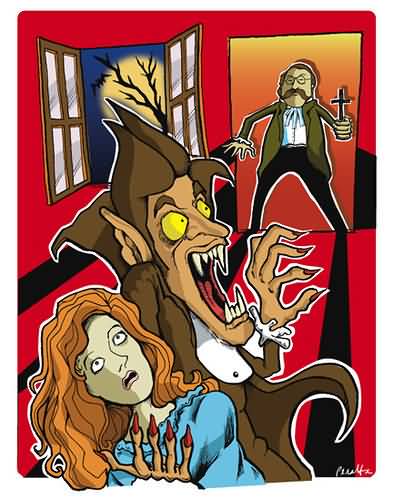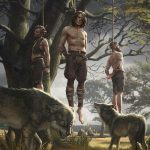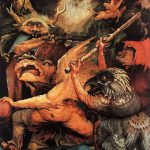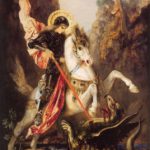
The Coffin Lid
A moujik was driving along one night with a load of pots. His horse grew tired, and all of a sudden it came to a stand-still alongside of a graveyard. The moujik unharnessed his horse and set it free to graze; meanwhile he laid himself down on one of the graves. But somehow he didn’t go to sleep.
He remained lying there some time. Suddenly the grave began to open beneath him: he felt the movement and sprang to his feet. The grave opened, and out of it came a corpse — wrapped in a white shroud, and holding a coffin lid — came out and ran to the church, laid the coffin-lid at the door, and then set off for the village.
The moujik was a daring fellow. He picked up the coffin-lid and remained standing beside his cart, waiting to see what would happen. After a short delay the dead man came back, and was going to snatch up his coffin-lid — but it was not to be seen. Then the corpse began to track it out, traced it up to the moujik, and said:
“Give me my lid: if you don’t, I’ll tear you to bits!”
“And my hatchet, how about that?” answers the moujik. “Why, it’s I who’ll be chopping you into small pieces!”
“Do give it back to me, good man!” begs the corpse.
“I’ll give it when you tell me where you’ve been and what you’ve done.”
“Well, I’ve been in the village, and there I’ve killed a couple of youngsters.”
“Well then, now tell me how they can be brought back to life.”
The corpse reluctantly made answer:
“Cut off the left skirt of my shroud, and take it with you. When you come into the house where the youngsters were killed, pour some live coals into a pot and put the piece of the shroud in with them, and then lock the door. The lads will be revived by the smoke immediately.”
The moujik cut off the left skirt of the shroud, and gave up the coffin-lid. The corpse went to its grave — the grave opened. But just as the dead man was descending into it, all of a sudden the cocks began to crow, and he hadn’t time to get properly covered over. One end of the coffin-lid remained sticking out of the ground.
The moujik saw all this and made a note of it. The day began to dawn; he harnessed his horse and drove into the village.
In one of the houses he heard cries and wailing. In he went — there lay two dead lads.
“Don’t cry,” says he, “I can bring them to life!”
“Do bring them to life, kinsman,” say their relatives. “We’ll give you half of all we possess.”
The moujik did everything as the corpse had instructed him, and the lads came back to life. Their relatives were delighted, but they immediately seized the moujik and bound him with cords, saying:
“No, no, trickster! We’ll hand you over to the authorities. Since you knew how to bring them back to life, maybe it was you who killed them!”
“What are you thinking about, true believers! Have the fear of God before your eyes!” cried the moujik.
Then he told them everything that had happened during the night. Well, they spread the news through the village; the whole population assembled and swarmed into the graveyard. They found out the grave from which the dead man had come out, they tore it open, and they drove an aspen stake right into the heart of the corpse, so that it might no more rise up and slay. But they rewarded the moujik richly, and sent him away home with great honor.
- Source: W. R. S. Ralston, Russian Folk-Tales (London: Smith, Elder and Co., 1873), pp. 309-311.
- Ralston’s source: Aleksandr Afanasyev, v., pp. 142-144. “From the Tambof Government.”
The Two Corpses
A soldier had obtained leave to go home on furlough — to pray to the holy images, and to bow down before his parents. And as he was going his way, at a time when the sun had long set, and all was dark around, it chanced that he had to pass by a graveyard. Just then he heard that some one was running after him, and crying:
“Stop! You can’t escape!”
He looked back and there was a corpse running and gnashing its teeth. The soldier sprang on one side with all his might to get away from it, caught sight of a little chapel, and bolted straight into it.
There wasn’t a soul in the chapel, but stretched out on a table there lay another corpse, with tapers burning in front of it. The soldier hid himself in a corner, and remained there hardly knowing whether he was alive or dead, but waiting to see what would happen. Presently up ran the first corpse — the one that had chased the soldier — and dashed into the chapel. Thereupon one that was lying on the table jumped up, and cried to it:
“What hast thou come here for?”
“I’ve chased a soldier in here, so I’m going to eat him.”
Come now, brother! He’s run into my house. I shall eat him myself.”
“No, I shall!”
“No, I shall!”
And they set to work fighting; the dust flew like anything. They’d have gone on fighting ever so much longer, only the cocks began to crow. Then both the corpses fell lifeless to the ground, and the soldier went on his way homeward in peace, saying:
“Glory be to Thee. O Lord! I am saved from the wizards!”
- Source: W. R. S. Ralston, Russian Folk-Tales (London: Smith, Elder and Co., 1873), p. 312.
- Ralston’s source: Aleksandr Afanasyev, vi., pp. 324-325.
The Soldier and the Vampire
A certain soldier was allowed to go home on furlough. Well, he walked and walked, and after a time he began to draw near to his native village. Not far off from that village lived a miller in his mill. In old times the soldier had been very intimate with him: why shouldn’t he go and see his friend? He went. The miller received him cordially, and at once brought out liquor; and the two began drinking, and chattering about their ways and doings. All this took place towards nightfall, and the soldier stopped so long at the miller’s that it grew quite dark.
When he proposed to start for his village, his host exclaimed:
“Spend the night here, trooper! It’s very late now, and perhaps you might run into mischief.”
“How so?”
“God is punishing us! A terrible warlock has died among us, and by night he rises from his grave, wanders through the village, and does such things as bring fear upon the very boldest! How could even you help being afraid of him?”
“Not a bit of it! A soldier is a man who belongs to the crown, and ‘crown property cannot be drowned in water nor burnt in fire.’ I’ll be off: I’m tremendously anxious to see my people as soon as possible.”
Off he set. His road lay in front of a graveyard. On one of the graves he saw a great fire blazing. “What’s that?” thinks he. “Let’s have a look.” When he drew near, he saw that the warlock was sitting by the fire, sewing boots.
“Hail, brother!” calls out the soldier.
The warlock looked up and said:
“What have you come here for?”
“Why, I wanted to see what you’re doing.”
The warlock threw his work aside and invited the soldier to a wedding.
“Come along, brother,” says he, “let’s enjoy ourselves. There’s a wedding going on in the village.”
“Come along!” says the soldier.
They came to where the wedding was; there they were given drink, and treated with the utmost hospitality. The warlock drank and drank, reveled and reveled, and then grew angry. He chased all the guests and relatives out of the house, threw the wedded pair into a slumber, took out two phials and an awl, pierced the hands of the bride and bridegroom with the awl, and began drawing off their blood. Having done this, he said to the soldier:
“Now let’s be off.”
Well, they went off.
On the way the soldier said:
“Tell me; why did you draw off their blood in those phials?”
“Why, in order that the bride and bridegroom might die. Tomorrow morning no one will be able to wake them. I alone know how to bring them back to life.”
“How’s that managed?”
“The bride and bridegroom must have cuts made in their heels, and some of their own blood must then be poured back into those wounds. I’ve got the bridegroom’s blood stowed away in my right-hand pocket, and the bride’s in my left.”
The soldier listened to this without letting a single word escape him. Then the warlock began boasting again.
“Whatever I wish,” says he, “That I can do!”
“I suppose it’s quite impossible to get the better of you?” says the soldier.
“Why impossible? If any one were to make a pyre of aspen boughs, a hundred loads of them, and were to burn me on that pyre, then he’d be able to get the better of me. Only he’d have to look out sharp in burning me; for snakes and worms and different kinds of reptiles would creep out of my inside, and crows and magpies and jackdaws would come flying up. All these must be caught and flung on the pyre. If so much as a single maggot were to escape, then there’d be no help for it; in that maggot I should slip away!”
The soldier listened to all this and did not forget it. He and the warlock talked and talked, and at last they arrived at the grave.
“Well, brother,” said the warlock, “now I’ll tear you to pieces. Otherwise you’d be telling all this.”
“What are you talking about? Don’t you deceive yourself; I serve God and the Emperor.”
The warlock gnashed his teeth, howled aloud, and sprang at the soldier — who drew his sword and began laying about him with sweeping blows. They struggled and struggled; the soldier was all but at the end of his strength. “Ah!” thinks he, “I’m a lost man — and all for nothing!” Suddenly the cocks began to crow. The warlock fell lifeless to the ground.
The soldier took the phials of blood out of the warlock’s pockets, and went on to the house of his own people. When he had got there, and had exchanged greetings with his relatives, they said: “Did you see any disturbance, soldier?”
“No, I saw none.”
“There now! Why we’ve a terrible piece of work going on in the village. A warlock has taken to haunting it!”
After talking awhile, they lay down to sleep. Next morning the soldier awoke, and began asking: “I’m told you’ve got a wedding going on somewhere here?”
“There was a wedding in the house of a rich moujik,” replied his relative, “but the bride and bridegroom have died this very night — what from, nobody knows.”
They showed him the house. Thither he went without speaking a word. When he got there, he found the whole family in tears.
“What are you mourning about?” says he.
“Such and such is the state of things soldier,” say they.
“I can bring your young people to life again. What will you give me if I do?”
“Take what you like, even were it half of what we’ve got!”
The soldier did as the warlock had instructed him, and brought the young people back to life. Instead of weeping there began to be happiness and rejoicing; the soldier was hospitably treated and well rewarded. Then — left about, face! off he marched to the Starosta, and told him to call the peasants together and to get ready a hundred loads of aspen wood. Well, they took the wood into the graveyard, dragged the warlock out of his grave, placed him on the pyre, and set it alight — the people all standing round in a circle with brooms, shovels, and fire-irons. The pyre became wrapped in flames, the warlock began to burn. His corpse burst, and out of it crept snakes, worms, and all sorts of reptiles, and up came flying crows, magpies, and jackdaws. The peasants knocked them down and flung them into the fire, not allowing so much as a single maggot to creep away! And so the warlock was thoroughly consumed, and the soldier collected his ashes and strewed them to the winds. From that time forth there was peace in the village.
The soldier received the thanks of the whole community. He stayed at home some time, enjoying himself thoroughly. Then he want back to the czar’s service with money in his pocket. When he had served his time, he retired from the army, and began to live at his ease.
- Source: W. R. S. Ralston, Russian Folk-Tales (London: Smith, Elder and Co., 1873), pp. 314-318.
- Ralston’s source: Aleksandr Afanasyev, v., pp. 144-147. “From the Tambof Government.”
The Shroud
In a certain village there was a girl who was lazy and slothful, hated working, but would gossip and chatter away like anything! Well, she took it into her head to invite the other girls to a spinning party. For in the villages, as every one knows, it is the lazybones who gives the spinning-feast, and the sweet-toothed are those who go to it.
Well, on the appointed night she got her spinners together. They span for her, and she fed them and feasted them. Among other things they chatted about was this — which of them all was the boldest?
Says the lazybones: “I’m not afraid of anything!”
“Well then,” say the spinners, “if you’re not afraid, go past the graveyard to the church, take down the holy picture from the door, and bring it here.”
“Good, I’ll bring it; only each of you must spin me a distaff-full.”
That was just her sort of notion: to do nothing herself, but to get others to do it for her. Well, she went, took down the picture, and brought it home with her. Her friends all saw that sure enough it was the picture from the church. But the picture had to be taken back again, and it was now the midnight hour. Who was to take it? At length the lazybones said: “You girls go on spinning. I’ll take it back myself. I’m not afraid of anything!”
So she went and put the picture back in its place. As she was passing the graveyard on her return, she saw a corpse in a white shroud, seated on a tomb. It was a moonlight night; everything was visible. She went up to the corpse, and drew away its shroud from it. The corpse held its peace, not uttering a word; no doubt the time for it to speak had not come yet. Well, she took the shroud and went home.
“There!” says she, “I’ve taken back the picture and put it in its place; and, what’s more, here’s a shroud I took away from a corpse.” Some of the girls were horrified; others didn’t believe what she said, and laughed at her.
But after they had supped and lain down to sleep, all of a sudden the corpse tapped at the window and said: “Give me my shroud! Give me my shroud!”
The girls were so frightened they didn’t know whether they were alive or dead. But the lazybones took the shroud, went to the window, opened it, and said: “There, take it.”
“No,” replied the corpse, “restore it to the place you took it from.” Just then the cocks suddenly began to crow. The corpse disappeared.
Next night, when the spinners had all gone home to their own houses, at the very same hour as before, the corpse came, tapped at the window, and cried: “Give me my shroud!”
Well, the girl’s father and mother opened the window and offered him his shroud. “No,” says he, “let her take it back to the place she took it from.”
“Really now, how could one go to a graveyard with a corpse? What a horrible idea!” she replied. Just then the cocks crew. The corpse disappeared.
Next day the girl’s father and mother sent for the priest, told him the whole story, and entreated him to help them in their trouble. “Couldn’t a service be performed?” they said.
The priest reflected awhile; then he replied: “Please tell her to come to church tomorrow.”
Next day the lazybones went to church. The service began, numbers of people came to it. But just as they were going to sing the cherubim song, there suddenly arose, goodness knows whence, so terrible a whirlwind that all the congregation fell flat on their faces. And it caught up that girl, and then flung her down on the ground. The girl disappeared from sight; nothing was left of her but her back hair.
- Source: W. R. S. Ralston, Russian Folk-Tales (London: Smith, Elder and Co., 1873), pp. 307-309.
- Ralston’s source: Aleksandr Afanasyev, v. no. 30a, pp. 140-142. “From the Voroneje Government.”
- Ralston’s footnote concerning “her back hair”: “The kosa or single braid in which Russian girls wear their hair.”
- This is a folktale of Aarne-Thompson type 366.
The Dog and the Corpse
A moujik went out in pursuit of game one day, and took a favorite dog with him. He walked and walked through woods and bogs, but got nothing for his pains. At last the darkness of night surprised him. At an uncanny hour he passed by a graveyard, and there, at a place where two roads met, he saw standing a corpse in a white shroud. The moujik was horrified, and knew not which way to go — whether to keep on or to turn back.
“Well, whatever happens, I’ll go on,” he thought; and on he went, his dog running at his heels. When the corpse perceived him, it came to meet him; not touching the earth with its feet, but keeping about a foot above it — the shroud fluttering after it. When it had come up with the sportsman, it made a rush at him; but the dog seized hold of it by its bare calves, and began a tussle with it. When the moujik saw his dog and the corpse grappling with each other, he was delighted that things had turned out so well for himself, and he set off running home with all his might. The dog kept up the struggle until cock-crow, when the corpse fell motionless to the ground. Then the dog ran off in pursuit of its master, caught him up just as he reached home, and rushed at him, furiously trying to bite and to rend him. So savage was it, and so persistent, that it was as much as the people of the house could do to beat it off.
“Whatever has come over the dog?” asked the moujik’s old mother. “Why should it hate its master so?”
The moujik told her all that had happened.
“A bad piece of work, my son!” said the old woman. “The dog was disgusted at your not helping it. There it was fighting with the corpse — and you deserted it, and thought only of saving yourself! Now it will owe you a grudge for ever so long.”
Next morning, while the family were going about the farmyard, the dog was perfectly quiet. But the moment its master made his appearance, it began to growl like anything.
They fastened it to a chain; for a whole year they kept it chained up. But in spite of that, it never forgot how its master had offended it. One day it got loose, flew straight at him, and began trying to throttle him. So they had to kill it.
- Source: W. R. S. Ralston, Russian Folk-Tales (London: Smith, Elder and Co., 1873), pp. 313-314.
- Ralston’s source: Aleksandr Afanasyev, vi., pp. 321-322.








